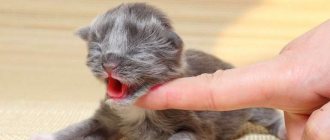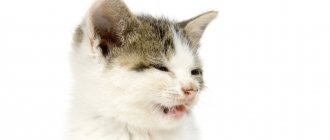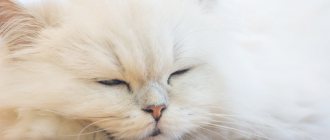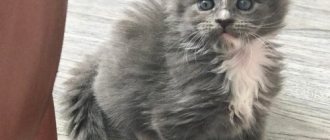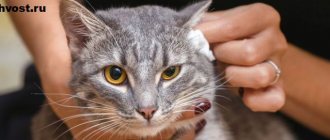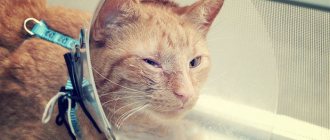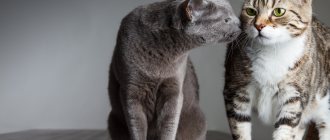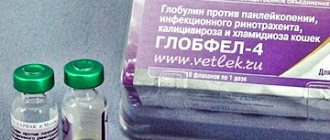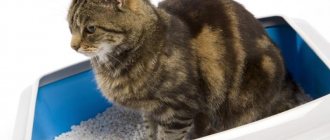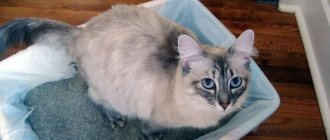Causes of the disease
10 main causes of constipation in a kitten:
- When weaning from the mother cat, new foods are introduced into the kitten’s diet: natural or industrial. The baby’s imperfect body cannot switch to other foods without interruption. If it is impossible to digest it well, the kitten may begin to suffer from constipation.
- A stressful situation affects the digestion of food and the lack of bowel movements, for example, such a reason could be moving, separation from the mother cat.
- Foreign body in the baby's intestines. This can be any object that the kitten is interested in and swallows. It could also be the baby’s fur, which he began to lick himself. Regardless of the origin of a foreign object, penetrating the intestines, it can get stuck in it and block the functioning of the entire system.
- Errors in feed selection. For example, a predominant amount of protein without adding vegetables and cereals can cause a lack of stool.
- The presence of internal parasites (worms) is one of the causes of constipation.
- A disease of any nature (viral, infectious), as well as taking prescribed medications for a pet’s illness or vitamin supplements can lead to constipation.
- The cause of constipation may be the kittens' lack of mobility.
- Often, constipation can be caused by insufficient fluid in food.
- Toxic or chemical poisoning of the baby, for example, poisoning with household chemicals or rodent control drugs, can cause constipation.
- The development of a dangerous illness in a pet’s body (diabetes mellitus, stomach or intestinal cancer, and others) can also cause constipation.
Causes of constipation in kittens
Often, poor nutrition and lack of fluid in it lead to this problem. It could be:
- overfeeding with easily digestible or concentrated foods;
- intake of dry food, and as a result – lack of fluid;
- malnutrition may also be an important cause;
- poor quality food.
Foreign body:
- when licking fur, pieces of undercoat can get into the intestines, making defecation difficult;
- small kittens can swallow small play objects - paper, a piece of tape or elastic.
Worm infestation. You should first relieve the attack of constipation, and then begin treatment against worms.
Sedentary lifestyle.
Serious diseases associated with health pathologies, especially if constipation is accompanied by severe thirst. These can be cysts, tumors, liver and kidney diseases.
Main symptoms
The main symptoms include:
- absence of stool for more than three days, possible discharge of mucus or feces in the form of dry small peas;
- refusal of food and/or water;
- bloating, touching the tummy causes discomfort and pain;
- repeated attempts to go to the toilet, the pet sits in a characteristic position, but cannot relieve the intestines;
- the baby refuses to play, is depressed;
- the pet meows anxiously, as if calling for help in overcoming the pain.
What symptoms appear?
An animal with this problem may also suffer from bloating.
Constipation in a one-month-old kitten or an older baby is always accompanied by restless behavior of the animal. The kitten meows loudly and refuses to eat. On palpation, the abdomen is hard, swollen, filled with gases. The cat may often squat down to poop, but nothing comes out, or during defecation, a foul-smelling green slurry is released instead of feces. If you still managed to squeeze out feces, then in appearance it resembles dry peas. With such symptoms, cats require urgent medical attention; untimely treatment leads to general intoxication of the body and even the death of the baby.
Diagnostics in a veterinary clinic
The danger of constipation is that, as a rule, it is not an independent disease, but serves as a sign of a developing illness in the kitten or a malfunction of its body.
If signs of constipation are detected, you should contact a veterinary clinic. A late visit to the clinic can lead to serious consequences, and in advanced cases, to the death of the pet.
To identify the causes of bowel dysfunction, your doctor may order blood and urine tests. In such cases, an x-ray examination with a contrast agent or an ultrasound of the abdominal cavity is indicated.
If your kitten is constipated: what to look for
In this article we will not consider the causes of this pathological condition, but we note that most often the pathology is in one way or another connected with the nutritional characteristics (including the mother of the kittens).
Before starting any active actions, it is necessary to analyze the following nuances:
- When exactly and after what did the pet stop defecating?
- How long has this been going on?
- Were antiparasitic treatments carried out, and when, in particular, was the last one?
- Has the baby’s diet changed recently, and has this happened too abruptly?
All of the above will certainly help to quickly identify the causes of constipation. In addition, we recommend contacting your veterinarian immediately if:
- The kitten not only strains, but also constantly, pitifully meows.
- The excreted pieces of feces show abundant clots of blood and mucus.
- Palpation of the abdomen reveals severe tension in the abdominal wall and pain.
- Also, the help of a specialist will not hurt if the kitten has not pooped for more than three days.
If you experience bloating due to constipation, you should not self-medicate.
This sign often indicates one of two most dangerous pathologies:
- Or is it a foreign body in the intestines.
- Or full-fledged coprostasis, which is impossible to cure at home.
If in these cases you try to “help” the pet by giving it drugs that enhance intestinal motility, then the kitten will most likely die from intestinal rupture . So, if there is severe bloating, you should immediately call a veterinarian, without wasting time on dangerous attempts at self-medication.
What to do at home: the main tasks of the owner
The first priority is to provide your pet with an unlimited amount of clean drinking water. The more the baby drinks, the better the semi-dry stool in the intestines will be moistened, and the greater the chance of coping with constipation on its own.
If the kitten does not drink, or his thirst is not very pronounced, you will have to force him to drink. In such cases, we strongly recommend that you immediately seek help from a veterinarian, as your pet will almost certainly require intravenous fluids.
The second most important task of the owner is to create a diet enriched with dietary fiber that stimulates intestinal motility. In addition, it is necessary to create a strict feeding schedule that will help return the kitten's digestive system to normal.
To do this, you can use two simple folk remedies: pumpkin puree and bran. It is best to use puree, since its sweetish taste and pleasant consistency do not cause rejection in the animal, and therefore the baby does not have to be force-fed. A kitten can be given up to one teaspoon of this product per day.
You should not overdo it, as in this case you can achieve the exact opposite result (i.e. constipation will be replaced by diarrhea, which is even more dangerous for the kitten).
You need to be careful with bran when treating constipation in kittens, as it can severely irritate your pet’s digestive tract. Be sure to consult your veterinarian when adding any nutritional supplements to your kitten's diet!
You need to play with the kitten more often. Don’t forget that physical activity is the key to an animal’s health (and more). The more active the pet runs and jumps, the more active the peristalsis of its intestines will be.
We do not recommend playing with your baby if he has recently eaten.
- First, it can make constipation worse.
- Secondly, physical activity with a tightly full stomach greatly increases the risk of volvulus and death.
Finally, you need to regularly and carefully observe your pet, noting any oddities in its behavior. If, despite the owner's best efforts, the animal's condition does not improve within two days or more, consultation with a veterinarian is necessary.
Treatment method and prognosis
Based on the diagnostic results, the doctor will prescribe treatment.
Depending on the indications and in the vast majority of cases, a deep cleansing enema is performed to empty the intestines.
In addition to medications, the pet is prescribed maintenance drips.
If you consult a doctor in a timely manner, the treatment prognosis is favorable. This applies to cases when we are not talking about burdening the kitten’s body with a serious illness.
What to do for prevention?
The owner who takes a four-legged baby into his home must understand that the health and proper development of the pet’s body depends on proper care and maintenance. If the kitten has ever had digestive problems and was bothered by constipation, after eliminating the disease, it is necessary to continue to constantly monitor so that this does not happen again.
As a preventive measure, veterinarians advise reviewing the animal’s diet and excluding from it foods that are prohibited for the cat’s body. It is best to switch your pet to ready-made food, which will help solve the problem of constipation. In addition, do not forget about drinking regime, physical activity, timely treatment of various diseases and scheduled preventive visits to the veterinarian.
What to do at home
If a kitten has a problem, there is no need to self-medicate. Malfunction of the intestines is a serious reason for examining your pet.
After undergoing an examination at the clinic and receiving a doctor’s recommendations, it is necessary to carry out the therapy prescribed by the doctor at home to normalize the activity of the gastrointestinal tract in the kitten.
When preparing to take medications, you should be careful about the dosage due to the differences between adult cats and kittens. Overdose is not allowed. Medicines are taken in the quantity prescribed by the doctor.
If medications are stored in the refrigerator, it is necessary to clarify the rules for preparing them for use.
Possible complications
An obvious improvement in a pet’s condition does not always indicate its complete recovery. The animal goes to the toilet, but cannot completely empty its bowels. Because of this, intoxication of the body gradually occurs, which is difficult to notice.
An attentive kitten owner should pay attention to the loss of his activity compared to the period before the disease, deterioration of appetite, and the appearance of nausea. All this may be signs of chronic constipation, untreated in the acute period.
To avoid serious consequences, you must seek help from a veterinary clinic and not expose your pet to danger.
To avoid intestinal failure, it is worth taking a number of preventive measures.
Helping a kitten with constipation
Different causes of constipation will require different action algorithms .
First aid
But first aid should be provided immediately.
- Give liquid food with a small amount of vegetable oil.
- Drink milk, it is better to dilute condensed milk with cold water. This method works immediately, but should not be overused, because it is harmful to the kitten’s liver.
- If you have Vaseline oil, you can drop it into your mouth 23 times until the stool returns to normal, at the rate of 1.5 ml per kg of weight. This is the most universal and effective way to relieve your pet's suffering. Oil softens feces, while lubricating the intestinal walls without being absorbed, unlike vegetable oil. Usually this tactic quickly eliminates constipation.
Interesting: The cat has a runny nose. Treatment for cat rhinitis
If the pet’s condition remains poor, the stomach is bloated and there is no appetite, you can do an enema with chamomile infusion. If you cannot cope on your own, you should contact your veterinarian.
A method with a bar of soap works well for constipation . You need to make a very thin peg of soap, wet it and try to insert it into the sleeping kitten’s anus. Resistance will be aggressive, so you need to not only hold the kitten well, but also massage its tummy a little and press lightly on it. This will allow you to insert the peg freely. In the morning, stool should appear.
Use of laxatives and medications
Constipation in a kitten can be treated by giving it laxatives and medications that improve intestinal microflora.
Of the laxatives, lactulose-based preparations are the safest and work well for constipation. These are Dufelac, Lactusan, Vaseline oil also belongs to this category of products.
- Dufelac is given 2 times a day at a rate of 0.5 ml per kg of weight. If you serve this laxative, then Vaseline oil should be noted. They have the same action.
- You can give Festal or Espumisan, after consulting with your veterinarian on the dose.
- A good supplement in the treatment of constipation would be drugs from the bifidumbacterin series, which improve the microflora in the intestines. They are used for a long time in the same way as in children.
After the problem of constipation has been resolved, when your pet’s stool has returned to normal, you should think about further prevention to prevent such situations in the future.
Prevention and other assistance measures
If the cause of constipation is hair clumps in the intestines, then the best laxative will be a specially sold paste for dissolving hair in the intestines.
And proper care and systematic combing of the fur will protect the kitten from their harmful effects. To prevent worms, you need to buy anthelmintic drugs and feed your cat with them at least once a season.
Interesting: What to do if the cat cannot pee
Frisky games with the kitten and a lot of movement relieve the difficulties of defecation; he empties his intestines faster and easier than when he sleeps all day, curled up in a ball.
If constipation does not go away, and the kitten’s condition becomes worse, vomiting appears, then urgent medical attention . Severe intoxication of the body leads to disruption of the functioning of internal organs and threatens life. Perhaps this condition of the kitten will require intensive therapy in the form of injections.
If laxatives help, but the problem keeps coming back, then you need to change the kitten’s nutritional system.
Professional treatment
The specialist determines the cause of constipation. If intestinal obstruction is diagnosed, surgical treatment is performed. In case of helminthic etiology of stool retention, the spasm is first relieved, and only then deworming is carried out. If you do the opposite, dying parasites can cause intoxication with a fatal outcome.
Duphalac
Intestinal emptying is carried out using the methods indicated above, or a prebiotic drug is prescribed. Duphalac is in demand - a syrup containing the carbohydrate lactulose. The nutrient easily passes through thickened fecal matter. It is absorbed by the beneficial lactic acid microflora of the intestine, and only by it. Lactulose is not available to pathogenic bacteria.
Digestion is normalized. Lactic acid microbes liquefy the compacted contents and it is expelled from the intestines.
Veterinarian advice
If the situation is not yet dangerous, veterinarians advise supplementing treatment at home with petroleum jelly. It is poured from the side into the cat's mouth using a disposable syringe without a needle. Individual dosage – from 5 to 50 milliliters per day.
Vetpharmacies also have special preparations in their arsenal: “Lactusan”, “Duphalac”, “Sodium picosulfate”, thanks to which he can poop. Plus the well-known “Festal” and “Espumizan”. But Magnesia (magnesium sulfate) is contraindicated for cats as a laxative! We hope our tips will be useful to you and your pets. Take care of them, and they will return you a hundredfold!
Prevention
To prevent constipation, it is necessary to use high-quality ready-made food. As prescribed by the doctor, prebiotics or probiotics are used - drugs that normalize digestion. To prevent intestinal blockage from parasitic worms. Regular deworming is carried out.
We invite you to join our Zen channel and group on VKontakte or Odnoklassniki, where new articles for pet owners are published.
Similar articles:
- My cat has a nosebleed - what should I do?
- Inflammation of the lower lip in a cat
- Clear nasal discharge in cats
